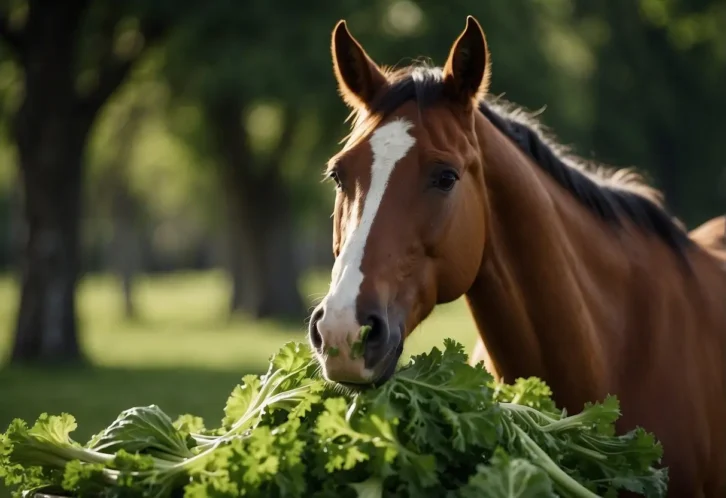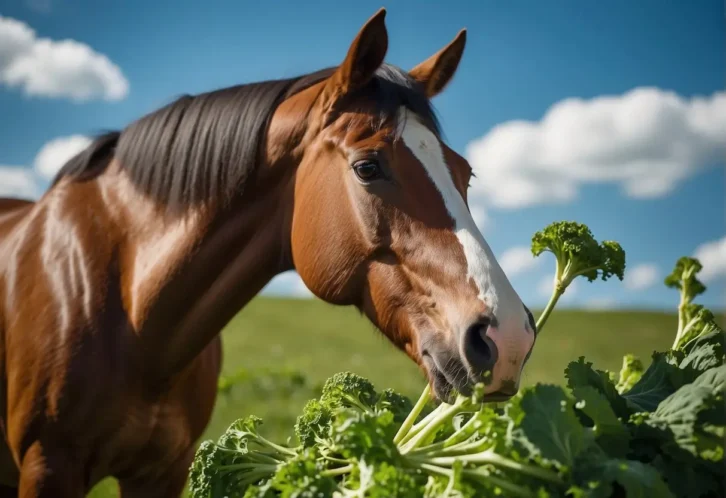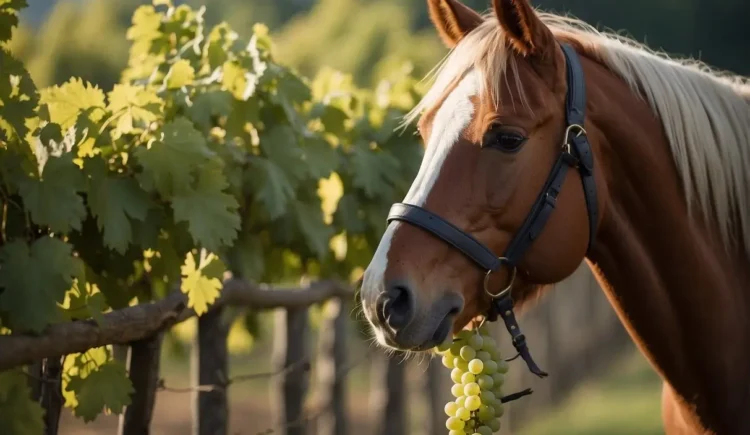Can a Horse Eat Celery? Understanding Equine Safe Snacks
Ever wondered if your horse would munch on a crunchy celery stick alongside its hay? The answer might surprise you! Horses can not only safely eat celery, but it can also serve as a healthy and hydrating snack. This crisp vegetable offers a good source of fiber and water, adding both variety and nutritional value to your equine friend’s diet. In this article, we’ll delve into the benefits of celery for horses, along with expert tips on how to safely incorporate it into their meals.

However, it’s crucial to be aware of the proper way to feed celery to horses to prevent any potential health risks. Celery should be offered in bite-sized pieces to ensure it does not pose a choking hazard.
Despite its benefits, celery should be fed sparingly as part of a balanced diet to maintain optimal horse health and avoid digestive issues.
Main Points
- Horses can eat celery as a healthy treat in moderation.
- It is important to cut celery into bite-sized pieces to avoid choking hazards.
- Celery should complement a balanced equine diet and not be overfed.
Equine Diet Fundamentals
A balanced equine diet is essential for maintaining a horse’s health and meeting their energy requirements. Understanding the specific nutritional needs, selecting appropriate feed types, and ensuring safe feeding practices are critical components that horse owners must consider.
Understanding a Horse’s Nutritional Needs
Horses require a diet that provides ample fiber, vitamins, minerals, and water to sustain their digestive system and overall health. The cornerstone of an equine diet typically includes hay or grass, which should be readily available to fulfill their need for fiber.
Supplements and concentrates may be added to provide necessary vitamins and minerals that forage alone might not supply.
- Key Nutrients:
- Fiber: Critical for digestive health; primarily from hay and grass.
- Vitamins & Minerals: Essential for bodily functions; often supplemented if not sufficient in forage.
- Protein: Important for growth and muscle maintenance.
- Water: Must be available at all times to maintain hydration and assist in digestion.
Common Feed and Treat Types
In addition to hay and pasture, grains such as oats or commercially available pelleted feeds are common in equine diets, offering concentrated sources of energy.
While fruits and vegetables can be provided as treats, they should be introduced gradually and fed in moderation. Treats like celery can offer hydration and a variety in flavors, as long as they are safe and free from toxins.
- Feed Types:
- Forage: Hay and grass; makes up the majority of the diet.
- Grains: Concentrated energy sources; includes oats, corn, barley.
- Treats: Fruits and vegetables; should not exceed recommended amounts.
Safety and Moderation in Feeding
When feeding horses, safety and moderation are paramount. Each horse’s diet should be tailored to their individual needs, taking into account activity level, age, and health status.
Feed must be free of mold, pesticides, and toxic substances. Hygiene is also critical when handling feed to prevent the spread of diseases.
- Safety Guidelines:
- Caution with new foods; introduce slowly to prevent digestive upset.
- Hygiene: Clean storage and feeding areas to avoid contamination.
- Organic Options: May reduce exposure to pesticides, but still need scrutiny for safety.
Celery as Part of a Horse’s Diet
Celery can be a hydrating, low-calorie snack for horses, offering nutritional benefits when included in their diet with caution. It’s vital to balance its intake to avoid risks such as choking and digestive upset.
Nutritional Profile of Celery
Celery is known for its high water content and fiber, beneficial for hydration and digestion in horses. It’s a vegetable that’s not only low in calories but also provides essential vitamins and minerals.
These include vitamin A, magnesium, potassium, phosphorus, calcium, and manganese.
The Benefits and Risks of Feeding Celery
Feeding celery to horses comes with its benefits; it can support hydration and serve as a source of antioxidants like vitamin C. A study on equine diets has also hinted at benefits against insulin resistance.
However, it poses a choking hazard if not prepared correctly and may lead to digestive upset or allergic reactions in some horses.
How to Safely Feed Celery to Horses
To safely incorporate celery into a horse’s diet, it should be chopped into small pieces and thoroughly washed to remove any contaminants. Always feed celery in moderation as a treat and ensure it’s not a central part of the diet.
Monitor the horse’s chewing to prevent any risk of choke. Consulting a veterinarian can also be a safe approach to adjust celery servings according to the horse’s weight and digestive sensitivity.
Healthy Treat Alternatives for Horses

While celery is a safe treat for horses, a varied diet consisting of different vegetables and fruits can contribute to the overall well-being of these animals.
It is important for owners to choose safe, nutritious options that cater to the horse’s need for variety without compromising their health.
Variety of Vegetables and Fruits as Treats
Horses may enjoy a range of fruits such as apples, bananas, pears, and even pumpkin, all of which offer different nutritional benefits.
In terms of vegetables, options like carrots, broccoli, and kale serve as excellent treats. These should be provided in fresh and organic form when possible to ensure the absence of pesticides.
- Safe Fruits and Vegetables for Horses:
- Fruits: Apples, Bananas, Pears, Pumpkin
- Vegetables: Carrots, Broccoli, Kale
Horses should be given these treats in moderation, and all treats must be cleaned thoroughly to remove dirt or mold, with any seeds or nuts removed to prevent choke.
Special Considerations for Treat Selection
When selecting treats, it’s critical to consider the horse’s individual needs, including potential allergic reactions or preexisting conditions like laminitis or metabolic issues.
For horses with HYPP (Hyperkalemic Periodic Paralysis), it’s essential to avoid high-potassium foods. Low-calorie treats are preferable for overweight horses or those prone to laminitis.
Certain plants and grains may be toxic or unsuitable for horses, so it’s vital to ensure the chosen treats are not harmful.
Additionally, treats should not replace a balanced diet of hay and feed, and should only be offered as an occasional treat to maintain nutrition without causing diarrhea or parasites. Always introduce new treats slowly and observe for adverse effects.
- Considerations for Treat Selection:
- Avoid treats with high potassium for horses with HYPP
- Prefer low-calorie treats for overweight horses
- Ensure treats are not toxic or harmful
- Introduce new treats gradually
Handling Specific Equine Health Concerns
When feeding horses, it’s essential to consider how dietary items affect their complex digestive system and their overall health.
Certain foods can pose risks such as colic or obesity, especially in horses with specific health concerns like insulin resistance or HYPP (Hyperkalemic Periodic Paralysis). Proper management of these issues often requires consultation with a veterinarian.
Dealing With Equine Dietary Sensitivities
Dietary sensitivities in horses, such as allergies or metabolic issues, necessitate careful feed management. A sensitive horse might require a tailored diet to avoid allergenic triggers and to manage conditions like laminitis or insulin resistance.
Introducing new foods gradually can help identify items that cause allergic reactions. Horses with HYPP, a genetic disorder, must have diets low in potassium to minimize symptoms.
When considering treats like celery, ensure they are suitable for the horse’s specific condition and always introduce them slowly to prevent any digestive upset.
Ensuring Proper Hydration and Digestive Health
Maintaining hydration is critical to a horse’s digestive health and overall well-being. Horses require access to clean, fresh water to stay adequately hydrated and support digestion.
Celery, with its high fiber content and soluble fiber, can be beneficial but it’s crucial to feed in moderation. Overfeeding can lead to a choking hazard or colic due to its stringy nature. For horses at risk of laminitis, low-sugar options are vital to prevent flare-ups.
Always consult a veterinarian when incorporating new feeds into a horse’s diet to maintain optimal digestive system health.
FAQs About Celery for Horses:
What vegetables are safe for horses to consume?
Horses can enjoy a variety of vegetables as part of their diet, including carrots, cucumbers, zucchini, and of course, celery. All vegetables should be offered in moderation and washed thoroughly to remove any pesticides or contaminants.
Are celery leaves safe for horses to eat?
Yes, horses can consume celery leaves in small quantities. However, as with any new food, it’s best to introduce them slowly to ensure the horse doesn’t have an adverse reaction. Some horses might find the leaves a bit bitter.
How much celery can a horse safely consume?
A general guideline is to offer a few stalks of celery (2-3) a few times per week. It’s crucial to chop the celery into bite-sized pieces to prevent choking. The ideal amount will vary depending on your horse’s size, diet, and individual needs.
Can I give my horse celery every day?
While celery is safe for horses, it’s better to offer it as an occasional treat rather than a daily staple. A varied diet is important, and overfeeding any single treat can lead to nutritional imbalances or digestive upset.
Is it safe for horses to eat both celery and carrots?
Yes, feeding horses both celery and carrots is perfectly safe. They make a healthy and tasty combination, as long as they are given in moderation as part of a balanced diet.
Can horses have celery juice as part of their diet?
Celery juice isn’t a common part of a horse’s diet. It’s generally better to feed them whole vegetables for the benefits of dental health and digestive fiber.
What are the possible benefits of feeding celery to horses?
Celery is a hydrating snack due to its high water content. It also offers vitamins and minerals like vitamin K, potassium, and folate that can complement a horse’s nutritional needs.
Are there any risks to feeding my horse celery?
When fed in moderation and prepared properly (washed and chopped), celery poses minimal risk. However, overfeeding could cause digestive upset. Always introduce new foods gradually and watch for any adverse reactions.
My horse has a health condition. Is celery still safe?
If your horse has any health conditions, consult your veterinarian before introducing celery or any new treats. They can advise on the appropriate amount and frequency based on your horse’s individual needs.
You Might Also Like:
- How Long Can a Horse Go Without Water: Essential Equine Hydration Facts
- Can Horses Eat Grapes? A Veterinarian’s Guide to Safety & Alternatives
- What Do Wild Horse Eat: Unveiling the Secrets of Their Natural Diet
Want more tips for optimal equine health? Explore our other Horse Nutrition & Diet articles!
Follow AnimalVine on Google News!
Conclusion:
Celery can be a refreshing, nutritious, and safe snack for your horse when offered in moderation. This hydrating treat provides essential vitamins and minerals, while the fiber content supports healthy digestion. Just remember to chop it into bite-sized pieces, introduce it gradually, and consult your veterinarian if your horse has any health concerns.



